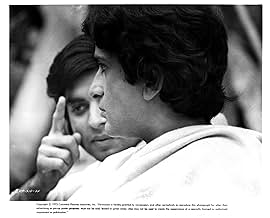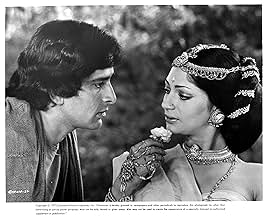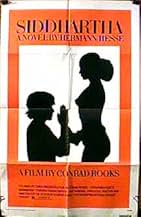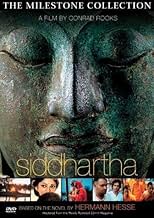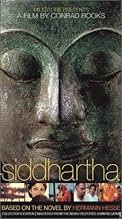ÉVALUATION IMDb
6,6/10
1,3 k
MA NOTE
Ajouter une intrigue dans votre langueThe story of a young Indian who embarks upon a journey to find the meaning of existence. Based on the novel by Hermann Hesse.The story of a young Indian who embarks upon a journey to find the meaning of existence. Based on the novel by Hermann Hesse.The story of a young Indian who embarks upon a journey to find the meaning of existence. Based on the novel by Hermann Hesse.
Histoire
Le saviez-vous
- AnecdotesSimi Garewal took the boldest step in her career by going topless for a scene in this film. It was the first topless scene in the history of Bollywood and created a massive uproar. When the scene was featured on the cover of two English magazines, it created more controversy and ended up in court. The film eventually got banned in India. When asked about it years later, Garewal, who said she was never shy, revealed that she would have stripped totally naked if they had let her. In fact, she had been totally nude in front of the filming crew for Mera Naam Joker the same year, but they only showed her from the back onscreen. She said she loved the freedom of losing her inhibitions and her clothes.
- Citations
Siddhartha: I have come to say, that you are all the things that will outlive me, that you, Kamala, will be all the beauty that will be in the shadow we leave. You will be my first love, my only love.
- ConnexionsReferenced in Thirtysomething: Melissa and Men (1991)
- Bandes originalesMother's Song
by Shanti Hiranand
Commentaire en vedette
No movie that is even marginally true to the story that Nobel Prize-winning German author Hermann Hesse told in his novel Siddhartha (1951) is without merit; and this modest film is no exception. The problem is, that while Conrad Brooks, who wrote, directed and produced the film, is true to the storyline of the novel and even in some respects true to the spirit of the novel, he fails to bring the power and the resplendence of Hesse's philosophic and spiritual masterpiece to the screen.
What made the novel one of the best ever written is the character of Siddhartha himself. Patterned after the Buddha both in temperament and in experience, Hesse's Siddhartha, "the Accomplished One," grew up amid extravagant wealth and privilege only to dump it all in an effort to find himself. Brooks fails almost immediately when he leaves out the scene from the book in which the young Siddhartha, not wanting to directly disobey his father (and to demonstrate his resolve) stands up all night waiting patiently for his father's permission to leave their splendid estates. This is one of the great "coming of age" scenes ever written and an early insight into Siddhartha's strength of character, but Brooks gives it barely a notice! Also skirted over too quickly are Siddhartha's years with the samanas in the forest where he practiced meditation and austerities. This part of Siddhartha's life was essential in making him the man he was and in showing us his character. He spent six years with the shamans and gurus of the forest (along with his companion Govinda) and in the end learned everything they knew and more, and yet had not found the answer he sought. (This parallels the experience of the "emaciated" Buddha.) Brooks does do the meeting with the Buddha well, having us hear his voice but not see him, and then follows that up with Siddhartha's reasons for not following the Buddha, even though he finds no fault with the Enlightened One's teachings. Note that without his actually meeting the Buddha, the life of Siddhartha (which is one of the traditional names of the Buddha) would so closely parallel that of the Buddha that some people might think that Hesse had written a profane life of the Buddha, which might not set well with some Buddhists! (Of course we all have the Buddha nature.) Siddhartha's life with the courtesan Kamala and the merchant Kamaswami and his spiral into debauchery and sloth is well depicted, although again the ultimate disillusionment that Siddhartha experienced is not as well presented as in the novel. Which brings me to Shashi Kapoor who plays Siddhartha. Although he would go on to be the veteran of well over a hundred films, and although he is appropriately enough Indian as well as tall, dark and handsome and a good actor, he fails to evoke the passion that Siddhartha must have. Siddhartha felt everything in a profound manner, even boredom was profoundly experienced by the Brahmin's prodigal son. Kapoor, especially near the end of the film when he plays an old man, occasionally made me feel that he could be "the Accomplished One," but more often he made me feel that he was holding something back.
Finally, the poetic scene near the end of the novel when, after living with and being guided by Vasudeva, the ferryman, Siddhartha becomes one with the river and falls spiritually into its wisdom, is only a bland shadow of what appears in the novel! Part of the reason for the failure probably has to do with a limited budget. The film is 83 minutes long, but could easily be twice that long. Part has to do with the selection of scenes and the emphasis on those scenes, and finally part of the reason has to do with the relative inexperience of Brooks who was only directing his second major film (and apparently his last). Certainly the on-location in India cinematography by Sven Nykvist who worked on so many films with Ingmar Berman is not to be faulted. Although not spectacular, Nykvist's camera conveys both the exotic beauty and the poverty of a landscape that could have been India 26 centuries ago.
(Note: Over 500 of my movie reviews are now available in my book "Cut to the Chaise Lounge or I Can't Believe I Swallowed the Remote!" Get it at Amazon!)
What made the novel one of the best ever written is the character of Siddhartha himself. Patterned after the Buddha both in temperament and in experience, Hesse's Siddhartha, "the Accomplished One," grew up amid extravagant wealth and privilege only to dump it all in an effort to find himself. Brooks fails almost immediately when he leaves out the scene from the book in which the young Siddhartha, not wanting to directly disobey his father (and to demonstrate his resolve) stands up all night waiting patiently for his father's permission to leave their splendid estates. This is one of the great "coming of age" scenes ever written and an early insight into Siddhartha's strength of character, but Brooks gives it barely a notice! Also skirted over too quickly are Siddhartha's years with the samanas in the forest where he practiced meditation and austerities. This part of Siddhartha's life was essential in making him the man he was and in showing us his character. He spent six years with the shamans and gurus of the forest (along with his companion Govinda) and in the end learned everything they knew and more, and yet had not found the answer he sought. (This parallels the experience of the "emaciated" Buddha.) Brooks does do the meeting with the Buddha well, having us hear his voice but not see him, and then follows that up with Siddhartha's reasons for not following the Buddha, even though he finds no fault with the Enlightened One's teachings. Note that without his actually meeting the Buddha, the life of Siddhartha (which is one of the traditional names of the Buddha) would so closely parallel that of the Buddha that some people might think that Hesse had written a profane life of the Buddha, which might not set well with some Buddhists! (Of course we all have the Buddha nature.) Siddhartha's life with the courtesan Kamala and the merchant Kamaswami and his spiral into debauchery and sloth is well depicted, although again the ultimate disillusionment that Siddhartha experienced is not as well presented as in the novel. Which brings me to Shashi Kapoor who plays Siddhartha. Although he would go on to be the veteran of well over a hundred films, and although he is appropriately enough Indian as well as tall, dark and handsome and a good actor, he fails to evoke the passion that Siddhartha must have. Siddhartha felt everything in a profound manner, even boredom was profoundly experienced by the Brahmin's prodigal son. Kapoor, especially near the end of the film when he plays an old man, occasionally made me feel that he could be "the Accomplished One," but more often he made me feel that he was holding something back.
Finally, the poetic scene near the end of the novel when, after living with and being guided by Vasudeva, the ferryman, Siddhartha becomes one with the river and falls spiritually into its wisdom, is only a bland shadow of what appears in the novel! Part of the reason for the failure probably has to do with a limited budget. The film is 83 minutes long, but could easily be twice that long. Part has to do with the selection of scenes and the emphasis on those scenes, and finally part of the reason has to do with the relative inexperience of Brooks who was only directing his second major film (and apparently his last). Certainly the on-location in India cinematography by Sven Nykvist who worked on so many films with Ingmar Berman is not to be faulted. Although not spectacular, Nykvist's camera conveys both the exotic beauty and the poverty of a landscape that could have been India 26 centuries ago.
(Note: Over 500 of my movie reviews are now available in my book "Cut to the Chaise Lounge or I Can't Believe I Swallowed the Remote!" Get it at Amazon!)
- DennisLittrell
- 15 févr. 2007
- Lien permanent
Meilleurs choix
Connectez-vous pour évaluer et surveiller les recommandations personnalisées
- How long is Siddhartha?Propulsé par Alexa
Détails
- Date de sortie
- Pays d’origine
- Sites officiels
- Langue
- Aussi connu sous le nom de
- На пути к истине
- Lieux de tournage
- société de production
- Consultez plus de crédits d'entreprise sur IMDbPro
- Durée1 heure 29 minutes
- Mixage
- Rapport de forme
- 2.35 : 1
Contribuer à cette page
Suggérer une modification ou ajouter du contenu manquant

Lacune principale
By what name was Siddhartha (1972) officially released in Canada in English?
Répondre


